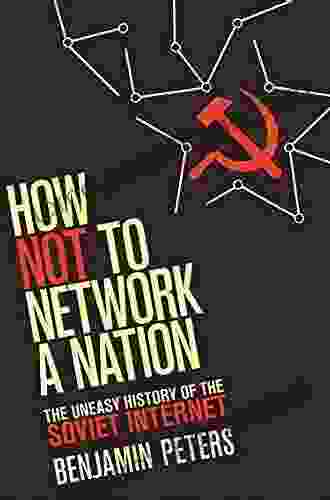The Uneasy History of the Soviet Internet Information Policy: A Tale of Control, Resistance, and Transformation

: The Dawn of a New Era
The arrival of the internet in the Soviet Union marked a watershed moment, promising unprecedented access to information and the potential to transform society. However, the Soviet government, deeply rooted in authoritarian principles, viewed this technological revolution with both trepidation and opportunity. Thus began a complex and often tumultuous journey of internet information policy, characterized by strict control, resistance, and eventual transformation.
4.3 out of 5
| Language | : | English |
| File size | : | 4976 KB |
| Text-to-Speech | : | Enabled |
| Screen Reader | : | Supported |
| Enhanced typesetting | : | Enabled |
| Word Wise | : | Enabled |
| Print length | : | 412 pages |
The Roots of Censorship and Control
The Soviet Union's approach to internet information policy was heavily influenced by its longstanding tradition of censorship and control over all forms of communication. The government saw the internet as a potential threat to its authority, fearing that unrestricted access to information could erode its ideological grip on society. Consequently, it implemented a stringent system of censorship, filtering content deemed politically sensitive or harmful to the state.
The mechanisms of control were far-reaching. Internet service providers (ISPs) were required to install government-approved software to block access to banned websites. Security agencies monitored online activity, and individuals caught accessing prohibited content faced severe consequences. This system of censorship effectively created a "digital divide" within Soviet society, with only a select few having access to unfiltered information.
The Rise of Resistance and Glasnost
Despite the government's efforts to control the internet, resistance emerged from within Soviet society. Dissident groups, activists, and independent journalists began using the internet to disseminate alternative perspectives and challenge official narratives. The rise of the glasnost and perestroika reforms under Mikhail Gorbachev in the late 1980s further emboldened these efforts, creating a climate of openness and increased tolerance for dissent.
Online forums and bulletin boards became platforms for lively discussions and debates on a wide range of topics, including political reform, human rights, and economic issues. These online spaces fostered a sense of community among like-minded individuals and provided an outlet for expressing opinions that would have been unthinkable under the old regime.
The Post-Soviet Era: Transformation and Challenges
With the collapse of the Soviet Union in 1991, the internet information landscape underwent a profound transformation. The government's grip on the internet weakened, and access to uncensored information became more widely available. Independent media organizations and civil society groups embraced the internet as a tool for promoting democratic values and holding the new Russian government accountable.
However, challenges remained. The transition to a market economy led to a digital divide between the wealthy and the poor, with limited internet access in rural and underserved areas. Moreover, the government continued to exercise some control over the internet, particularly during periods of political unrest or perceived threats to national security.
The Legacy and Lessons
The evolution of internet information policy in the Soviet Union and its aftermath offers valuable lessons for understanding the complex relationship between technology, society, and power. The Soviet government's attempts to control the internet ultimately failed, but its legacy continues to shape the way societies approach internet governance and freedom of expression.
The rise of resistance and the role of the internet in fostering dialogue and dissent highlight the transformative power of technology and the importance of protecting freedom of information. The ongoing challenges in bridging the digital divide and balancing security concerns with civil liberties underscore the need for continued vigilance and collaboration to ensure that the internet remains a space for open exchange and innovation.
The uneasy history of the Soviet internet information policy is a testament to the enduring tension between the desire for control and the quest for freedom of information. Through a complex interplay of censorship, resistance, and transformation, the internet has emerged as a powerful force for societal change, challenging traditional power structures and empowering individuals to connect, share ideas, and hold those in power accountable.
As we navigate the evolving digital landscape, it is crucial to draw upon the lessons learned from the Soviet experience and to continue fostering an environment where access to information is a fundamental right and where freedom of expression is fiercely protected.
4.3 out of 5
| Language | : | English |
| File size | : | 4976 KB |
| Text-to-Speech | : | Enabled |
| Screen Reader | : | Supported |
| Enhanced typesetting | : | Enabled |
| Word Wise | : | Enabled |
| Print length | : | 412 pages |
Do you want to contribute by writing guest posts on this blog?
Please contact us and send us a resume of previous articles that you have written.
 Book
Book Novel
Novel Page
Page Chapter
Chapter Text
Text Story
Story Genre
Genre Reader
Reader Library
Library Paperback
Paperback E-book
E-book Magazine
Magazine Newspaper
Newspaper Paragraph
Paragraph Sentence
Sentence Bookmark
Bookmark Shelf
Shelf Glossary
Glossary Bibliography
Bibliography Foreword
Foreword Preface
Preface Synopsis
Synopsis Annotation
Annotation Footnote
Footnote Manuscript
Manuscript Scroll
Scroll Codex
Codex Tome
Tome Bestseller
Bestseller Classics
Classics Library card
Library card Narrative
Narrative Biography
Biography Autobiography
Autobiography Memoir
Memoir Reference
Reference Encyclopedia
Encyclopedia Ben Stopher
Ben Stopher Chloe Lynch
Chloe Lynch Beth Cook
Beth Cook Patricia Lotich
Patricia Lotich Barry Ogston
Barry Ogston Jessica M Chapman
Jessica M Chapman Betsy Schow
Betsy Schow Jen Solis
Jen Solis Brie Wetherby
Brie Wetherby John D Burns
John D Burns Barbara Ann Kipfer
Barbara Ann Kipfer Stephen Goldberg
Stephen Goldberg Bernadette Fisers
Bernadette Fisers Ph D Jennifer J Thomas
Ph D Jennifer J Thomas Elliotte Rusty Harold
Elliotte Rusty Harold Zan Fraser
Zan Fraser Barney Saltzberg
Barney Saltzberg Barry Guitar
Barry Guitar Melissa Mccloud
Melissa Mccloud Barbara Briggs Anderson
Barbara Briggs Anderson
Light bulbAdvertise smarter! Our strategic ad space ensures maximum exposure. Reserve your spot today!

 David BaldacciMusic Ideology and Economic Collapse: Cultural Dislocations in Paris and...
David BaldacciMusic Ideology and Economic Collapse: Cultural Dislocations in Paris and...
 Isaac MitchellRandom Musings of a Law Student, Graduate, Writer, Musician, and General...
Isaac MitchellRandom Musings of a Law Student, Graduate, Writer, Musician, and General... Chuck MitchellFollow ·17.6k
Chuck MitchellFollow ·17.6k Victor HugoFollow ·11.1k
Victor HugoFollow ·11.1k Ted SimmonsFollow ·10.6k
Ted SimmonsFollow ·10.6k Henry GreenFollow ·2.8k
Henry GreenFollow ·2.8k Mark TwainFollow ·2.2k
Mark TwainFollow ·2.2k Nikolai GogolFollow ·13.7k
Nikolai GogolFollow ·13.7k Braden WardFollow ·8.5k
Braden WardFollow ·8.5k Jordan BlairFollow ·16.2k
Jordan BlairFollow ·16.2k

 Corey Hayes
Corey HayesEasy Delicious Recipes To Heal The Immune System And...
: The Cornerstone...

 Cody Russell
Cody RussellMastering Medical Terminology: A Comprehensive Guide for...
Navigating the...

 Ibrahim Blair
Ibrahim BlairBeat Cancer Symptoms: Your Essential Guide to Symptom...
Are you struggling with the debilitating...

 Finn Cox
Finn CoxHow to Be the Best at Work and Still Have Time to Play:...
Are you tired...
4.3 out of 5
| Language | : | English |
| File size | : | 4976 KB |
| Text-to-Speech | : | Enabled |
| Screen Reader | : | Supported |
| Enhanced typesetting | : | Enabled |
| Word Wise | : | Enabled |
| Print length | : | 412 pages |












